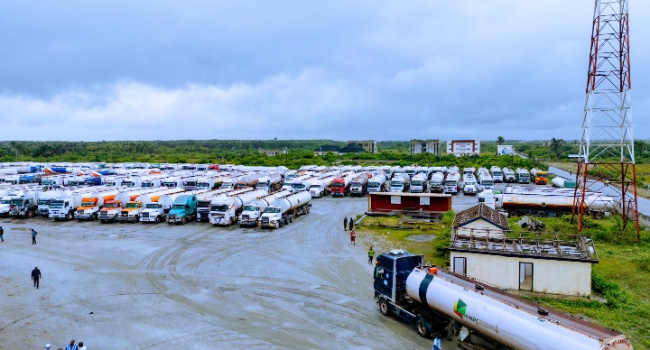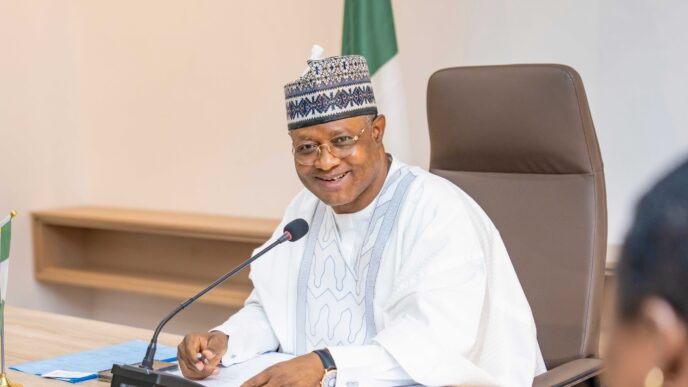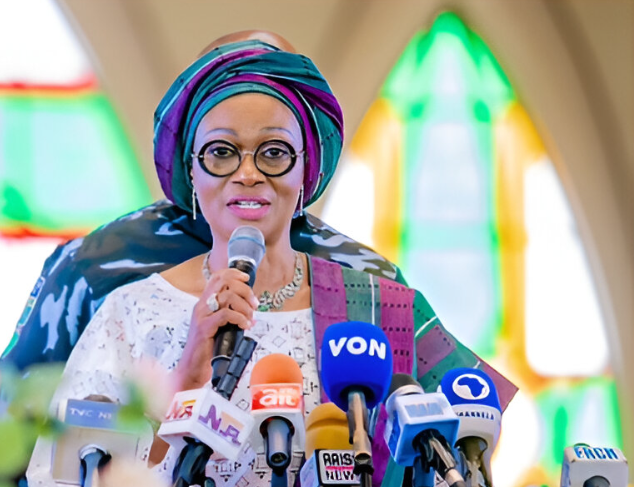NNPC's trucks waiting to load at Dangote refinery
As I sit down to pen this week’s column, I can’t help but feel a deep sense of déjà vu wash over me. Just when you think the tumultuous saga of Nigeria’s fuel supply has reached some semblance of resolution, along comes a new set of plot twists to rattle the cages once more.
The latest episode in this endless melodrama pits the mighty Dangote Refinery against the seemingly hapless oil marketers, with the ever-present NNPC caught in the middle – or perhaps orchestrating the whole charade from the shadows. It’s a dizzying game of one-upmanship, where each party is hell-bent on coming out on top, regardless of the consequences for the long-suffering Nigerian consumer.
Let’s start with the self-proclaimed saviour of our fuel woes, Dangote Refinery. After years of hype and anticipation, their much-vaunted facility has finally come online, ready to singlehandedly quench the country’s thirst for petrol. Or so they would have us believe.
The initial plan, we’re told, was that only the NNPC would be allowed to buy fuel from Dangote. A neat little arrangement, no doubt cooked up in the backrooms of power. But as is often the case in Nigeria, the best-laid plans quickly unraveled.
Advertisement
Now, the oil marketers have dared to poke the bear, revealing that the price of fuel from the Dangote Refinery is actually higher than the imported product – ₦1,015 to ₦1,028 per liter – compared to the NNPC’s seemingly more affordable offering. Unsurprisingly, these wily merchants have vowed to undercut Dangote by sourcing their own imports.
But the Dangote camp, ever the masters of spin, have quickly fired back, accusing the marketers of colluding with international traders to bring in substandard, low-quality fuel. They insist that their refinery’s product is the superior option, and that any cheaper imports must be viewed with the utmost suspicion.
It’s a classic case of he-said, she-said, with each side desperately trying to paint the other as the villain of the piece. And where does that leave us, the poor souls who simply want to fuel our cars and power our homes without having to remortgage our futures? Caught in the crossfire, of course.
Advertisement
But make no mistake, this is no mere skirmish between industry players. This is a high-stakes battle for control and dominance in Nigeria’s downstream oil sector – a prize that Aliko Dangote, the country’s resident titan of industry, is clearly determined to seize.
After all, the man has sunk a staggering $20 billion into his refinery project. Do you really think he’s going to sit idly by and let the NNPC and its cronies call the shots? Of course not. Dangote wants a piece of the action, and he wants it all. And if that means strong-arming the independent marketers out of the picture, then so be it.
Now, I can understand Dangote’s perspective to a certain extent. If his refinery is truly capable of meeting the country’s fuel demand, then why shouldn’t the marketers be obligated to source their supplies from him, rather than continuing to import? It would certainly align with the government’s stated goal of reducing our reliance on foreign imports and bolstering domestic production.
But therein lies the rub. The marketers are not without their own valid concerns. They warn that allowing Dangote to establish a monopolistic stranglehold on the sector could ultimately harm consumers through higher prices and reduced competition. And history has certainly shown that unchecked monopolies often lead to suboptimal outcomes for the public.
Advertisement
So, where do we go from here? Well, it seems President Bola Tinubu has decided to step into the fray, summoning Dangote, the finance minister, and the NNPC boss to hash out this latest flare-up. One can only hope that the president has the wisdom and foresight to chart a course that balances the competing interests and, most importantly, prioritises the needs of the Nigerian people.
Perhaps the solution lies in striking a delicate equilibrium – leveraging Dangote’s refining capacity to meet a substantial portion of the country’s fuel needs, while also preserving a role for the independent marketers to maintain a healthy level of competition. This could involve a carefully structured system of quotas, pricing controls, and import allowances that ensure fair play and consumer protections.
But make no mistake, any misstep by Tinubu’s administration will be seized upon by the vultures circling overhead. The Dangotes of this world will not hesitate to flex their considerable muscle, while the NNPC will undoubtedly seek to manipulate the situation to their advantage. It’s a high-stakes game, and the stakes couldn’t be higher for the long-suffering Nigerian public.
Beyond this immediate fracas, we must also address the broader, deep-seated issues plaguing Nigeria’s downstream oil sector. Our chronic reliance on imports has been a blight on our economic and social development, sapping our resources and leaving us vulnerable to the whims of global price fluctuations. The successful commissioning of the Dangote Refinery, along with the NNPC’s own refining efforts, should be celebrated as a step in the right direction.
Advertisement
But this is merely the first step. Nigeria must continue to invest in its downstream infrastructure, explore innovative refining and distribution models, and work tirelessly towards true energy self-sufficiency. Only then can we break free from the shackles of fuel scarcity and price volatility that have dogged us for far too long.
The battle between Dangote, the NNPC, and the oil marketers is a microcosm of the larger challenges facing Nigeria’s energy sector. It is a complex, high-stakes game with no easy answers.
Advertisement
As for me, I’ll be watching this drama unfold with a mixture of fascination and trepidation. After all, I’ve seen these stories play out time and time again, and the ending is never quite what it seems. One thing is certain, though: the Nigerian consumer will be the one left holding the (fuel) can. Let’s hope Tinubu and his team can finally break the cycle and deliver the energy security we so desperately deserve.
Advertisement
Views expressed by contributors are strictly personal and not of TheCable.










